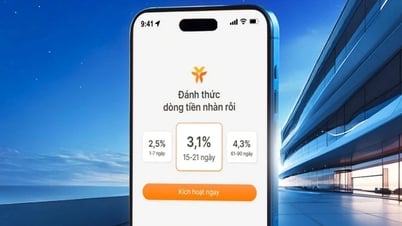The Ministry of Finance recently submitted a report to the Government on the proposal to develop a draft Law on Tax Administration (replacement).
Regarding the issue of tax management for business households, in the submission, the Ministry of Finance stated that if the lump-sum tax regulation is maintained, it will lead to serious revenue loss from large business households.
According to the Ministry, by the end of 2024, the country will have about 3.6 million business households and individual businesses.
Total tax revenue from business households and individual businesses in 2024 will reach nearly VND26,000 billion. Notably, there are more than 4,000 business households with revenue of over VND10 billion, but more than half of them still pay lump-sum tax at a very low rate, only about 0.4% of revenue, while the declaring households have to pay tax up to 25-30% of revenue.
"This creates unfairness and unfair competitive advantages," the Ministry of Finance emphasized.
In addition, the average lump-sum tax rate is only about 686,000 VND/month, nearly 5 times lower than the average declared tax rate of 3.29 million VND/month, creating an unfair competitive advantage.
Compared to other countries, the ratio of business households to Vietnam's population in 2024 will only reach 2.17%, much lower than the US (6.88%), Canada (8.97%), UK (8.55%), India (4.19%), and Thailand (5.63%). The Ministry of Finance emphasized that maintaining lump-sum tax does not encourage business households to develop and transform into enterprises.
In the context of the digital economy forecast to grow 11 times by 2030, reaching 220 billion USD, the inability to control the actual revenue and electronic transactions of hundreds of thousands of online businesses will be a major obstacle to the national digital transformation process.
"The failure to monitor the actual cash flow of 286,000 business households with revenue from 200 million to less than 1 billion VND creates risks of money laundering, tax fraud and affects economic security," the Ministry of Finance emphasized.
The Ministry of Finance believes that completely eliminating the lump-sum tax will help end the serious injustice in which the tax rate of a declared household is up to 7 times higher than that of a lump-sum tax household, thereby effectively preventing budget losses from large businesses.
The Ministry of Finance believes that completely eliminating the lump-sum tax will help end the serious injustice in which the tax rate of a declared household is up to 7 times higher than that of a lump-sum tax household.
Therefore, in the coming time, the Ministry of Finance proposes to clarify the legal status and responsibilities of business households in fulfilling tax obligations based on the revenue criteria of micro-enterprises and small enterprises according to the provisions of the Law on Support for Small and Medium Enterprises.
Along with that, the regulation on lump-sum tax for business households and individual businesses is removed. Supplementing the regulation on business households and individual businesses applying the mechanism of self-declaration and self-payment of tax according to the direct tax calculation method (percentage of revenue) consistent with the provisions of the Law on Value Added Tax and the Law on Personal Income Tax.
Supplementing regulations on the percentage of VAT taxable revenue for business households with revenue scale equivalent to micro-enterprises or small and medium-sized enterprises to ensure fairness and encourage business households and individual businesses to switch to the enterprise model.
Supplementing regulations on the percentage rate of taxable income or taxable revenue to calculate personal income tax for business individuals with revenue scale equivalent to micro-enterprises or small and medium-sized enterprises in the Law on Personal Income Tax.
The Ministry of Finance also proposed to supplement regulations on accounting and invoice regimes. For business households and individuals with revenue of VND1 billion/year or more, a simple accounting regime will be applied like small and medium enterprises. These individuals and business households will have to use electronic invoices with or without codes from the tax authority. Currently, households selling goods and services directly to consumers must use electronic invoices generated from cash registers connected to transfer data to the tax authority from June 1, according to Decree 70.
Households with revenue subject to value added tax (from 200 million VND to less than 1 billion VND per year) will apply electronic invoices with or without codes from the tax authority. They can use electronic invoices generated from cash registers if conditions permit, or payment bills that meet the conditions for electronic invoices.
This group is also allowed to use simple invoices that allow them to create "electronic sales receipts" via apps, Zalo, SMS, or QR code templates. However, these households must have a roadmap to apply electronic invoices generated from cash registers with data connections to tax authorities...
(According to VTV)
Source: https://baoyenbai.com.vn/12/351653/Bo-Tai-chinh-Bo-thue-khoan-giup-cham-dut-tinh-trang-bat-cong-nghiem-trong.aspx

































































































Comment (0)